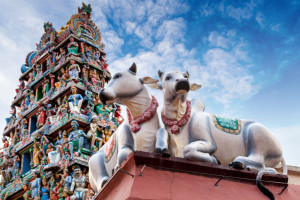
A Hindu commentator takes on some “liberal” and “progressive” Western news sources that have launched journalistic salvos blaming Hindus well-known reverence for cows and other animals in India for allegedly causing starving school children. Articles in the New York Times and on NPR recently discuss new regulations that ban beef in schools in some parts of India, while other places have eliminated eggs from school menus.
Showing Their Bias
The author notes that the headline writers choose especially accusatory and judgmental phrases like:
- ” Saving Cows; Starving Children”
- “Egg War: Why India’s Vegetarian Elite Are Accused of Keeping Kids Hungry”
The tone of the articles is similar to the attention-grabbing headers, she notes. The author sees neo-colonialism when journalists in Washington, D.C., pass judgment on practices and institutions half a world away, where complex social history is deeply intertwined with vegetarianism. The author affirms that “we cannot dismiss what is the oldest living, continuous tradition of vegetarianism in the world as mere superstition.”
Blaming the Hindu “Elite”
The writers frame their stories about the policies to exclude beef products and eggs from some school menus in India in terms of “elite” Hindus who use religion to deny sustenance to poor schoolchildren. The author sees this as indulging in classic Western stereotypes. No longer is the country ruled by a wealthy, powerful caste that arrogantly imposes its religious beliefs about treatment of animals on the poor huddled masses of the lower castes, she notes, and she finds the attitudes expressing that outdated view to be offensive.
Social upheaval and evolution of Indian society in the late twentieth and early twenty-first century have led to a very different power structure, she notes, which seems to be glossed over in the rush to judge the new rules forbidding beef and eggs in school diets. The problem of a long-distance judgmental attitude is obvious, she notes, even beyond the opinions of writers who choose the slant of their stories. Public commentators online discussing the NPR story toss off judgmental one-liners like “lose the religion; eat some beef.”
An Enormous Leap in Human Civilization
The author states that, “the importance given to vegetarianism in India for the simple reason that our ancestors knew we could live without taking an animal life, is an enormous leap in human civilization that Western civilization has had a very tough time coming around to accept.” [Emphasis added.]
She is forthright about the need for society at large to consider, now, in “the present, preparing for a future where one day we might well wake up with a start, as we did about second-hand smoke, about the needlessness of the mass industrial slaughter of animals, birds, and sea-life that we routinely accept as a global way of life today.”
Convenience Chain Goes to Eggless Mayo
With no Hindu elite making the rules, a major U.S. convenience store corporation made a decision to shift to an eggless mayo on all of their sandwiches and in-store prepared items. Known across the country as a place to grab a quick bite but never thought of as a place to get health food nor as a bastion of animal rights, 7-11 stores will still offer traditional mayonnaise for sale in jars, alongside the vegan replacement that has no eggs, no cholesterol and none of the negative side effects on health or the environment that result from intensive animal agriculture. Industry experts suspect the reason for the change has more to do with cost savings of an egg-free product than health or environmental concerns, however.
Toward the Future
The evidence in favor of a plant-based diet is clear. People who claim deep concern for the air, water and soil of planet Earth can no longer continue to consume animal products without an awareness of the massive negative impacts in pollution, wasteful use of water resources and other ecological impacts of animal-exploitative industrial agriculture.

